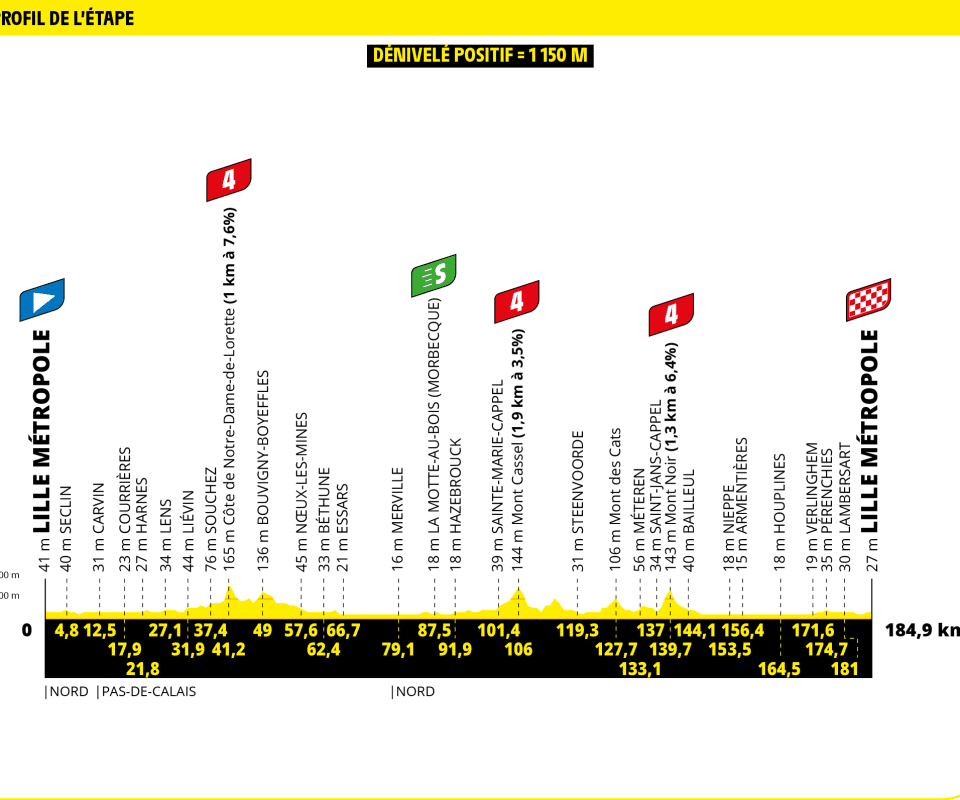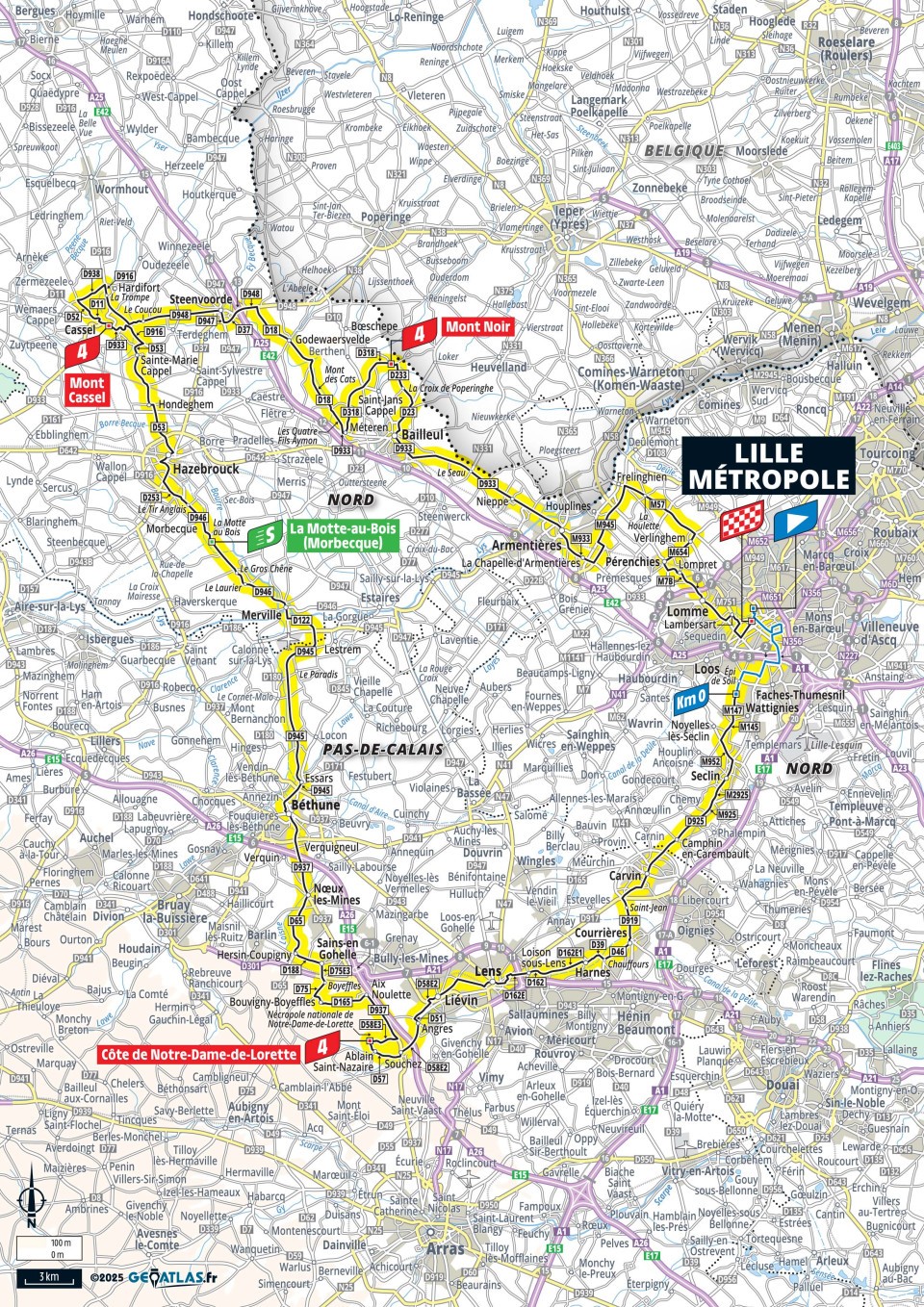After two years (2023 and 2024) of absence, Tour de France return to Lille. On the 5th July 2025 the first stage of the race wil start and also end in the city.
PROFILE

MAP


Lille is an old Tour de France contestant city. Its first appearance dates back to 1906.
WHEN WILL THE BIG MOUNTAINS COME?
Although the program of the long first week (first rest day only on 15th July) of this years Tour de France provides plenty of hilly stages, many of the fans are naturally waiting for the big mountains. The days in the Pyrenees and in the Alps.
The first high mountain stage will come on Thursday of the second week, on Stage 12.
Stage 13 will be the day of the most awaited 11 km long individual mountain time trial. The next day (Stage 14) will be still a day in the Pyrenees.
A Mont Ventoux stage will open the third week on Stage 16.
Peloton will visit the Alps only for two days, on Stage 18 and Stage 19
VINTAGE CYCLING IMAGE OF THE DAY

The first Tour de France was held between 1 and 18 July 1903. It included only 6 stages.(However, the complete route was 2428 km long). The race was won by one of the favourites, the French cyclist Maurrice Garin.
TOUR DE FRANCE LEGEND OF THE DAY
 Who else should we begin with the introduction of the greatest legends than Eddy Merckx.
Who else should we begin with the introduction of the greatest legends than Eddy Merckx.
Widely celebrated as the greatest cyclist in the history of the sport, Belgian legend Eddy Merckx earned the formidable nickname “The Cannibal” due to his relentless drive to win and his refusal to show mercy to his rivals, regardless of the race or stakes. His career was defined by an extraordinary level of dominance, most notably in the Tour de France, where he claimed overall victory five times—in 1969, 1970, 1971, 1972, and 1974. During those campaigns, Merckx amassed an astonishing 34 stage victories and spent a record-setting 96 days wearing the coveted yellow jersey, a mark of sustained superiority that remains unmatched.
However, Merckx’s greatness was not confined to the Tour alone. He demonstrated extraordinary versatility and endurance by winning all five of cycling’s prestigious Monuments—Milan–San Remo, Tour of Flanders, Paris–Roubaix, Liège–Bastogne–Liège, and Giro di Lombardia—an achievement that underscores his all-around brilliance across different terrains and race formats. In addition, he secured overall victories in other Grand Tours, including the Giro d’Italia and the Vuelta a España, further cementing his legacy as a complete and unstoppable force in professional cycling. His aggressive racing style, insatiable hunger for victory, and relentless pursuit of excellence have made Eddy Merckx an enduring symbol of cycling supremacy and competitive spirit.
Read more about Eddy Merckx :
Eddy Merckx’s epic solo victory in the Pyrenees (Tour de France 1969)
Eddy Merckx’s four grand tour victories in a row
Eddy Merckx’s only Vuelta a Espana victory (1973)
MORE RELATED TOPICS
50 greatest legends of Tour de France
10 most thrilling Pyrenees stages of the Tour de France in the 20th century
A LESSER KNOWN CYCLIST WITH EXCITING BACKSTORY

Abdel-Kader Zaaf (27 January 1917 – 22 September 1986) was an Algerian professional road cyclist renowned for his participation in the Tour de France during the late 1940s and early 1950s. Born in Chebli, Algeria, Zaaf competed in the Tour de France four times—in 1948, 1950, 1951, and 1952—completing the race only once, in 1951, when he finished last, earning the title of "lanterne rouge" .
Zaaf's most memorable moment came during the 13th stage of the 1950 Tour de France, a grueling ride from Perpignan to Nîmes under extreme heat. Alongside his teammate Marcel Molinès, Zaaf broke away from the peloton, establishing a significant lead. However, the intense heat took its toll, and Zaaf reportedly accepted a bottle from a spectator, allegedly containing wine. Soon after, he became disoriented, collapsed, and upon regaining consciousness, mistakenly rode in the wrong direction before being stopped by officials .
Despite this incident, Zaaf achieved several victories in regional races, including stage wins in the Tour d'Algérie and the Tour du Maroc . His career, marked by both notable successes and unforgettable episodes, has left a lasting legacy in the world of cycling.
